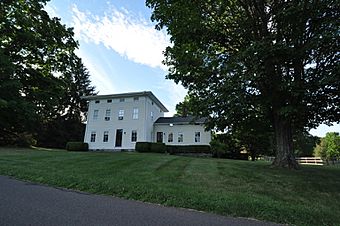Calhoun–Ives Historic District facts for kids
Quick facts for kids |
|
|
Calhoun–Ives Historic District
|
|
 |
|
| Location | 79-262 Calhoun St. and 11 and 12 Ives Rd., Washington, Connecticut |
|---|---|
| Area | 475 acres (192 ha) |
| Built | 1765 |
| Architect | Calhoun, Daniel; et al. |
| Architectural style | Colonial, Greek Revival, Post-Modern |
| NRHP reference No. | 95001344 |
| Added to NRHP | November 22, 1995 |
The Calhoun–Ives Historic District is a special area in Washington, Connecticut. It's like a living museum that shows what rural farm life was like a long time ago. This district is found about a mile north of Washington Depot. It stretches along Calhoun Street and Ives Road. Here, you can see old farmhouses from the 1700s and 1800s, along with barns, farm fields, and fruit orchards. Stone walls line the roads, adding to its historic charm. This important area was added to the National Register of Historic Places in 1995.
Contents
What is the Calhoun–Ives Historic District?
This historic district is a large area, about 475 acres (192 hectares) in size. It includes almost all the properties along Calhoun Street and Ives Road. The district also covers farm fields and extends towards Baldwin Hill Road, Kielwasser Road, and Bee Brook Road. It's a great example of how farms looked and worked in the 18th and 19th centuries.
A Look Back at History
The Calhoun–Ives area was first settled in the 1730s. At that time, it was part of the towns of Woodbury and Kent. The first families to settle here were the Calhouns, Ives, and Averills. They bought land from the Native Americans who lived there.
Farming Through the Years
At first, the farmers in this area grew just enough food for their own families. This is called "subsistence farming." But by the mid-1800s, things started to change. Farmers began to focus on "market-driven dairy farming." This means they raised cows to produce milk and other dairy products to sell. You can still see how the farms changed to fit this new way of farming.
Old Homes and Buildings
The oldest house in the district was built around 1765 by James Calhoun. You can find it at 156 Calhoun Street. There are also many old barns and other farm buildings from the 1800s. Some of the houses are beautiful examples of a style called Greek Revival architecture. This style was popular in the 1800s and often features grand columns and simple, elegant designs.
 | William M. Jackson |
 | Juan E. Gilbert |
 | Neil deGrasse Tyson |



